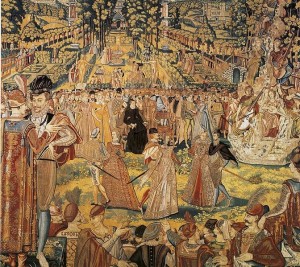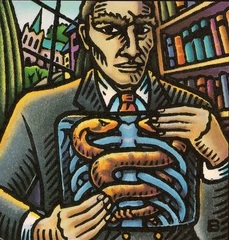 Earlier this month, I wrote about how Star Trek ignited my passion for writing and gave me the push I needed to start committing words to paper at a young age. Not all my early work, however, was Star Trek fan fiction; I also produced a couple of short original pieces, as well as a 100,000-word novel in ninth grade called The Investigators. What all these works have in common is that they were very terrible, though each one improved on the one that came before.
Earlier this month, I wrote about how Star Trek ignited my passion for writing and gave me the push I needed to start committing words to paper at a young age. Not all my early work, however, was Star Trek fan fiction; I also produced a couple of short original pieces, as well as a 100,000-word novel in ninth grade called The Investigators. What all these works have in common is that they were very terrible, though each one improved on the one that came before.
There are a number of failings in these first works, but the main problem is that I didn’t have a handle on structure. My understanding of plotting could be reduced to this: the plot is the sequence of events that occur over the course of the novel. I mean, you can’t get any vaguer than that. If you read my first novels (I don’t recommend it), this is evidenced by the overall sense that I was making the story up as I went along. There were so thematic underpinnings, the twists and turns came out of nowhere and served no purpose beyond surprise, and the characters did not progress through meaningful arcs. Lots of stuff happened, but none of it told a story. The plot points were random; I may as well have written some plot ideas on playing cards, shuffled them together, then wrote the novel based on the order of the cards with no thought towards what would make sense or provoke an emotional response in the reader. The plot was just what happened-and it could be anything.
In 1998, however, at the age of fifteen, I was washing dishes at the restaurant where I worked when a coworker, Carole, asked me if I’d ever seen Babylon 5. The two of us shared a passion for Star Trek, which is what we talked about most often, but I had barely heard of Babylon 5, even though the show had just about completed its five-year run by that time. Carole had the first couple of seasons recorded on VHS, so one day she came to work with a bag full of tapes for me.
I took those tapes home and began to devour them.
Much has been written about the unevenness of Babylon 5. Especially in the first season, the acting was rough, the effects were cheaply produced, and the writing was… bumpy. Awkward, even. And yet I immediately fell in love with the show, because it was the first time I encountered a television series that was unabashedly serialized. It was a show that was intended to be viewed in order. Though individual episodes had beginnings, middles, and ends, Babylon 5 told a larger story that could only be fully appreciated and understood in the context of many seasons.
Since that time, Babylon 5 has been followed by dozens of serialized shows, so many in fact that heavy serialization has become the norm. However, in terms of structure and planning, no show, in my opinion, has ever surpassed the high standard established by Babylon 5. The show’s creator and main writer, J. Michael Straczynski, personally scripted 91 of the 110 episodes, and wrote the last three seasons entirely by himself, with the exception of one installment. This resulted in unbridled consistency. From the beginning, he knew where the story was going. He had a full series outline. Many shows’ writers have claimed to have known the end from the beginning (I’m looking at you, Lost and Battlestar Galactica), but Babylon 5 is the only show I’m aware of that proves its structural integrity by directly foreshadowing its later twists and turns right from the very start. Rewatching the show, with full knowledge of how the show progresses and ultimately concludes, allows its genius to be fully appreciated.
Structurally, Babylon 5 taught me to think ahead. It taught me to think about consequences. It taught me to think about the significance of the events of my story, even the very small events. In fact, the very small events in my stories often end up triggering very large events down the road, something which Babylon 5 excelled at.
It could be said that Straczynski planned his show almost too well, with the effect of producing uneven episodes which aren’t always much fun when viewed in isolation. The plot momentum of that show, however, is pretty overwhelming-in a good way. When it comes to understanding the importance of structure, Babylon 5 provides a master’s course.



